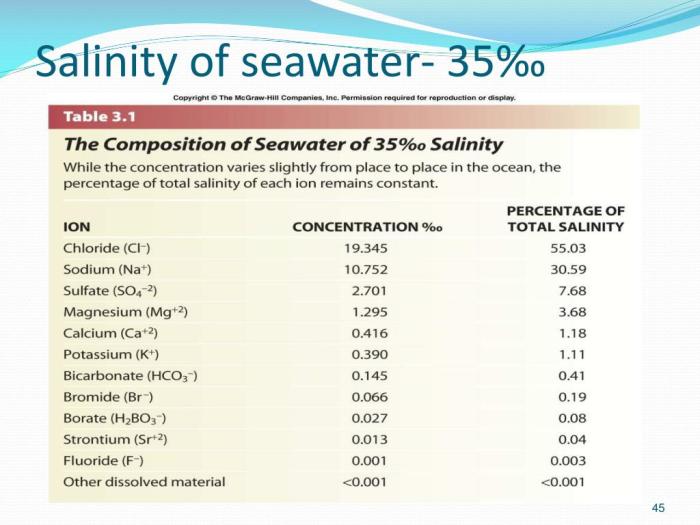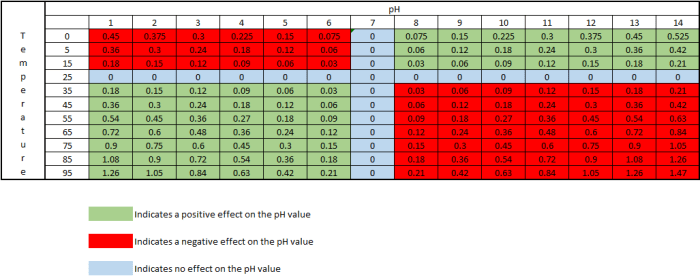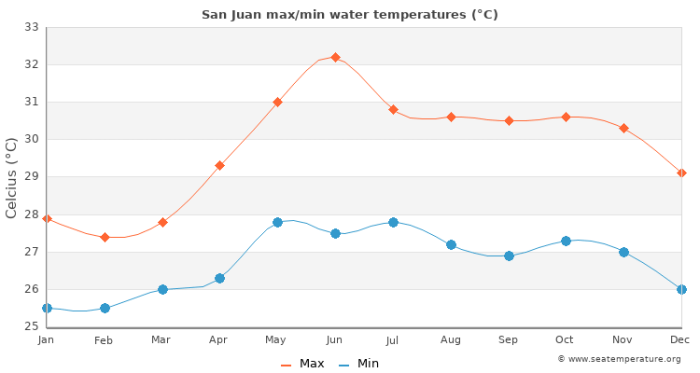Juan measured the temperature of saltwater, embarking on a scientific journey that unveils the unique thermal properties of this ubiquitous substance. From oceanography to environmental science, temperature data holds immense value, shaping our understanding of marine ecosystems and climate change.
This comprehensive analysis delves into the intricacies of temperature measurement, exploring the methods and instruments employed specifically for saltwater. By examining the factors that influence temperature and the applications of temperature data, we gain invaluable insights into the behavior of saltwater in various contexts.
Temperature Measurement

Temperature is a physical property that describes the thermal state of matter. It is a measure of the average kinetic energy of the particles in a substance. The SI unit of temperature is the Kelvin (K), but other units such as degrees Celsius (°C) and degrees Fahrenheit (°F) are also commonly used.
Temperature can be measured using a variety of instruments, including thermometers, thermocouples, and thermistors. Thermometers are the most common type of temperature measuring device. They work by using a liquid, such as mercury or alcohol, that expands or contracts when heated or cooled.
The amount of expansion or contraction is measured and converted into a temperature reading.
When measuring the temperature of saltwater, it is important to consider the unique properties of saltwater compared to freshwater. Saltwater is denser than freshwater, so it takes more energy to heat it up. Additionally, the presence of salt in water affects the temperature at which it freezes and boils.
Properties of Saltwater
- Saltwater is denser than freshwater.
- Saltwater has a higher specific heat capacity than freshwater.
- Saltwater freezes at a lower temperature than freshwater.
- Saltwater boils at a higher temperature than freshwater.
| Property | Saltwater | Freshwater |
|---|---|---|
| Density (kg/m3) | 1025 | 1000 |
| Specific heat capacity (J/kg K) | 3990 | 4187 |
| Freezing point (°C) | -1.8 | 0 |
| Boiling point (°C) | 101.3 | 100 |
Factors Influencing Temperature, Juan measured the temperature of saltwater
The temperature of saltwater can be influenced by a number of factors, including:
- The amount of salt in the water
- The temperature of the surrounding air
- The depth of the water
- The presence of currents
These factors interact in complex ways to affect the temperature of saltwater. For example, the amount of salt in the water can affect the temperature at which it freezes and boils. The temperature of the surrounding air can affect the temperature of the surface water.
The depth of the water can affect the temperature of the water at different depths. And the presence of currents can mix water of different temperatures, which can affect the overall temperature of the water.
Applications of Temperature Measurement
Temperature measurement is used in a variety of fields, including:
- Oceanography
- Marine biology
- Environmental science
In oceanography, temperature measurement is used to study ocean currents, which are important for understanding climate and weather patterns. In marine biology, temperature measurement is used to study the distribution and behavior of marine organisms, which are affected by water temperature.
In environmental science, temperature measurement is used to study the effects of pollution and climate change on aquatic ecosystems.
| Field | Purpose | Examples |
|---|---|---|
| Oceanography | Study ocean currents | Measuring the temperature of water at different depths and locations |
| Marine biology | Study the distribution and behavior of marine organisms | Measuring the temperature of water in different habitats |
| Environmental science | Study the effects of pollution and climate change on aquatic ecosystems | Measuring the temperature of water in polluted areas and in areas affected by climate change |
Commonly Asked Questions: Juan Measured The Temperature Of Saltwater
What is the significance of measuring saltwater temperature?
Saltwater temperature plays a vital role in understanding ocean currents, marine ecosystems, and climate change. It influences the distribution of marine life, affects the rate of chemical reactions in the ocean, and provides insights into global weather patterns.
How does salinity affect the temperature of saltwater?
Salinity has a significant impact on the temperature of saltwater. Saltier water has a higher freezing point and a lower boiling point compared to freshwater. This is because salt ions interfere with the formation of ice crystals and the evaporation of water molecules.
What are the common methods used to measure saltwater temperature?
The most common methods for measuring saltwater temperature include using thermometers, thermistors, and thermocouples. Thermometers are simple devices that measure temperature based on the expansion or contraction of a liquid or gas. Thermistors and thermocouples are electronic devices that measure temperature based on changes in electrical resistance or voltage.


